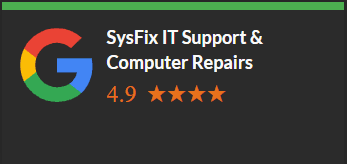Telephone: 020 3095 7740
The 10 Most Common Tech Support Issues
SysFix IT Support receives hundreds of IT support Issues each week yet the majority of them are old favourites. Despite advances in technology over the years, some probles reoccure time after time. Here's our top 10 IT tech support issues logged over the years.
- I've forgotten my password
We've all done it, especially after a weekend of shenanigans and that is why traditionally, Monday is the busiest day for any IT Helpdesk. It's good practice to set your own method of creating and remembering passwords. Passwords should be secure, including a capital letter, a number, a symbol, and be 8 or more characters in length. Equally, they should be changed at least every 3 months, be nothing to do with your name or other publically published information on your social media, and have not been used previously.
The easiest method here is to pick a word or phrase such as " red laptop". Capitalise it, change a letter for a number that looks like the letter and add a symbol to the end.
( Redlapt0p! ). Simple really. You can also use a password manager. Check out our guide on how to manage and keep your passwords safe. - My computer won't turn on
Usually the result of a failed component or in rare cases, it's not plugged in (Yes, it does actually happen). Remote IT support is generally conducted over the telephone to check the basics but usually would result in a site visit. - Blue Screen of Death
As disastrous as the message may read, it's not always the case. These messages usually occur due to a failed Windows update, faulty RAM, or corrupt windows files, all of which can usually be rectified without having to completely reinstall your whole computer. - Windows says it's performing an automatic repair but then restarts and repeats the process
This is a common issue we see extremely often and is usually the result of a failing hard drive. Drives start to become unreadable in certain areas with age or natural defects. If critical Windows files are located in this failed section of the disk, the system fails to start and an automatic recovery takes place. Unfortunately though, as it's a physical hardware issue, the automatic recovery will fail and the end-user is stuck in a constant loop. - My computer is slow
The number one cause of a slow computer is that it's simply underpowered. There are many low-cost desktop and laptop computers available these days but simply aren't up to the demands of the average user. When purchasing a computer, at the time of writing (2021), you should be aiming for a mid-range computer system with at least 8GB of RAM, an Intel i5 processor (or AMD Ryzen 5), and where possible, always opt for a solid-state disk (SSD).
Other causes of a slow computer relate to buggy software which can take up too much RAM or processor power, a failing hard drive, or bad drivers. We tend to perform a PC Health Check on slow devices, installing the latest windows updates and giving the machine the once over. - My internet is slow
People often assume that the internet connection is slow when it's actually not. Quite often, they're connected to a Wi-Fi network that has a weak signal. Plugging your computer into the router directly with a network cable often resolves the issue. Alternatively, WiFi signal boosters or extenders are required to ensure greater coverage and speed. In some cases though, it can be that older technology doesn't support the latest technology of your router. It could equally be that software on your computer (or someone else's on the network) is taking the majority of the bandwidth for themselves, like streaming movies or downloading large files. - I'm unable to access the shared drive
Small businesses tend to have their own on-site server within their premises, although there is an upward trend towards hosting data within the cloud. "Mapping a drive" within windows allows a computer to access a central storage location so all staff members can save their work to the same place which tends to be backed up each night. This shared access allows specific teams of people to grant specific access rights. For example, restricting the HR folder to 3 members of staff. - I'm unable to print
Usually the result of a printer not being connected to the WiFi network if it's a network printer. Equally, issues arise due to bad printer drivers or quite simply, the printer has run out of ink or paper. It's always prudent to check these things first before reaching out to your IT team. - My computer is frozen
Bad RAM or poorly coded software can grind a computer system to a halt. Overclocking your RAM or processor can also have disastrous effects. When your CP or Laptop has frozen, there's little that can be done other than to restart the machine. If you're working on important documents, always save your work often. - I've overwritten a file by mistake
Unfortunately for most, overwriting a file is a day of wasted time. One step forward and two steps back is often the case where a company or individual fails to implement an adequate data backup solution (if at all). Those lucky enough to have a reputable IT support company and a management team that values the importance of IT should have no issues recovering a deleted or overwritten file. Others however won't be so lucky and will have to start over.
Stay Informed
When you subscribe to the blog, we will send you an e-mail when there are new updates on the site so you wouldn't miss them.





